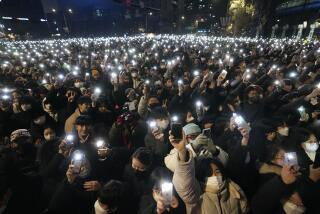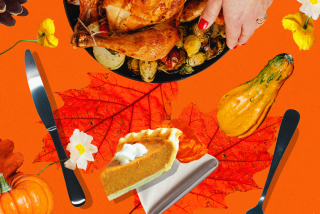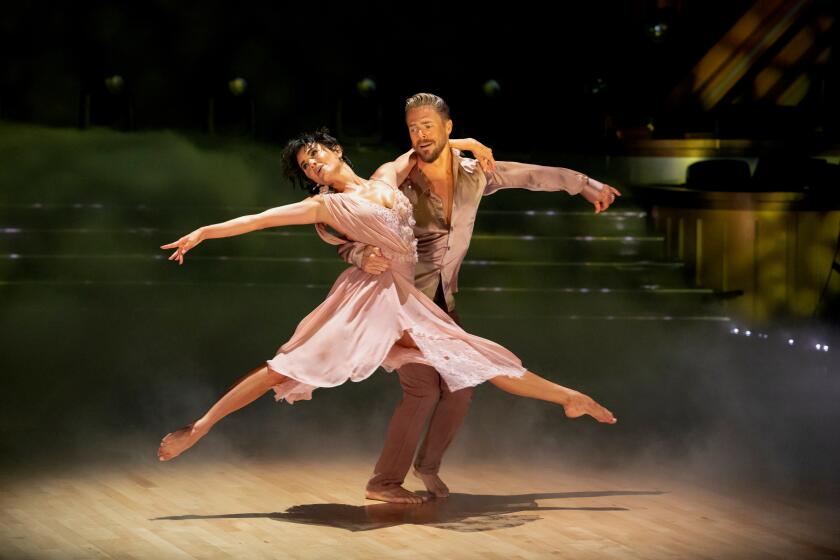The Importance of Being Ritualistic
It hit me this past July 4: Fewer and fewer Americans, especially the young and the urban, feel less and less American because of the absence of ritual.
The power and necessity of ritual hit me when our 3 1/2-year-old son asked my wife why she had hung a big American flag at the front of our house, the only house within blocks that displayed one. âItâs Americaâs birthday,â she told him.
The beauty of ritual was evident at the Hollywood Bowl, when 20,000 of us sang âAmerica the Beautifulâ along with the Los Angeles Philharmonic Orchestra; when I saw American flags atop the philharmonic basses; when we hummed American songs along with the orchestra; when fireworks lit up images of George Washington and the bald eagle.
Yet, many people have forgotten what is distinctive about America and canât convey a sense of Americanness to their children.
Also, the ideal of multiculturalism has replaced the ideal of the melting pot. While Americans always regarded themselves as multiethnic, much of the country now adheres to a vision of America as multicultural. Americaâs motto is being transformed from E pluribus unum--âFrom many, oneâ--to ânot one, many.â
Among many well-educated Americans, American ritual has either corny or sinister connotations. The very term âflag-waverâ connotes a person flirting with fascism. Compare the eliteâs reaction to someone wearing a flag pin with someone wearing an AIDS ribbon.
Just as the countryâs motto has been inverted, so, too, the concept of love of country has been inverted. When asked about his understanding of loving America and patriotism, I heard a leading liberal congressman talk only about his love of the Constitution. While loving the Constitution should be part of loving America and of patriotism, they are not synonymous. To understand why, imagine a man who, when asked if he loved his wife spoke only about how much he loved her values.
Thus we have abandoned ritual, and without ritual there is no memory.
This understanding of the indispensable role that ritual plays in remembrance is the secret to the survival of a much smaller people than Americans: the Jews. Ritual is the means by which, for thousands of years, Jews have been able to remember who they are. Conversely, Jews who do not practice Jewish rituals assimilate.
Take the most widely observed Jewish ritual: the Passover Seder. The purpose of the Seder is to remind Jews that God took them out of Egypt.
Without ritual, we either lose our national memories or retain only negative ones. Both are destructive to any group.
Without rituals to commemorate Independence Day, Americans are losing any meaning associated with our country and its birthday; it becomes just another day off, symbolized only by hot dogs and occasional fireworks. Without rituals, Presidents Day, for example, is merely a day for department store sales. Indeed, obliterating Washingtonâs and Lincolnâs birthdays as holidays and substituting the meaningless Presidents Day represents the eliteâs deafness to ritual and symbolism.
The ultimate de-Americanization of an American holiday takes place on Flag Day in some schools of the Los Angeles Unified School District. Students are encouraged to bring in the flags of the countries they or their ancestors came from. Perhaps on Presidents Day, we will begin honoring the presidents of all those countries.
On the other hand, we widely and meaningfully observe Thanksgiving, precisely because it is tied to a ritual: the Thanksgiving Day feast.
Next July 4, display a flag, sing American songs and play American music, attend a parade, read from the Declaration of Independence.
One of the worldâs youngest peoples needs to learn this secret to survival from one of the worldâs oldest.
More to Read
The biggest entertainment stories
Get our big stories about Hollywood, film, television, music, arts, culture and more right in your inbox as soon as they publish.
You may occasionally receive promotional content from the Los Angeles Times.










